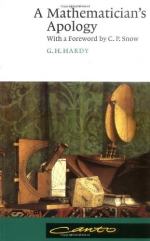|
This section contains 840 words (approx. 3 pages at 400 words per page) |

|
Aesthetics
One of Hardy's principal arguments is that theoretical mathematics, which he refers to as "real" or "pure" mathematics, has similar aesthetic qualities to those of art or poetry. Hardy invests much in his essay defending this position, explaining the beauty of Pythagoras's and Euclid's theorems, and comparing the aesthetics of pure mathematics to the simplistic and vulgar exercises that make up applied mathematics.
Aging, Prime of Life, Depression, and Melancholy
A Mathematician's Apology was written during the final years of Hardy's life, shortly after a heart attack and a series of other physical ailments had rendered him mostly sedentary. This theme colors much of the text. Whereas in his prime he could devote his days to intense studies of concepts and vigorous games of cricket, those abilities were long lost to him as he was writing this memoir. Hardy firmly believed that mathematics is a young man's game...
|
This section contains 840 words (approx. 3 pages at 400 words per page) |

|




